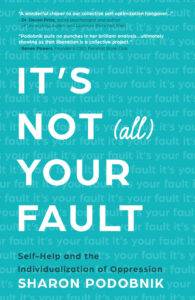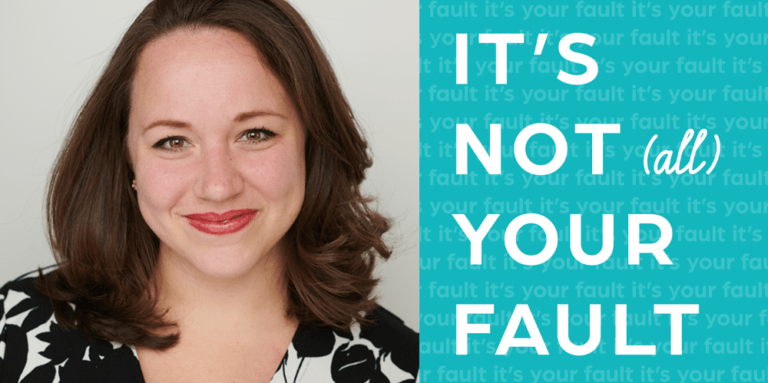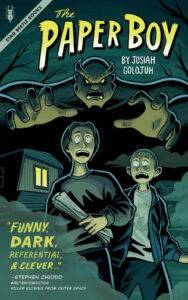“Podobnik pulls no punches in her brilliant analysis… ultimately showing us that liberation is a collective project.” — Renee Powers, Founder & CEO, Feminist Book Club
From the Publisher: “This could be the last self-help book you ever read.
Self-help books promise transformation and empowerment but rarely deliver real change. What gives?
Despite what we’ve been told, no amount of self-help, quick-fixes, or mind-hacks will get us where we need to go. We cannot transform our futures through willpower and hard work alone.
It’s Not (All) Your Fault reveals the ways self-help—though well-meaning—is deeply flawed and keeps us trapped in stagnant cycles. It makes all of society’s problems your problems.
Sharon Podobnik draws on extensive industry and personal experience to offer a fresh perspective on personal development and collective transformation, revealing their inextricable link and demonstrating that well-being depends on solidarity, not self-optimization.
Whether you’re a self-help enthusiast, skeptic, or outspoken activist, this book is essential reading. Through captivating stories and insightful research, Podobnik reorients us to our power, provides radical strategies for growth and change, and brings conscious awareness to what we already know: the future is a collaborative effort.
Despite what the world has told you, it’s not all your fault.”
More info About the Author: (Pittsburgher) Sharon Podobnik is a leadership coach, author, and speaker known for her work at the intersection of individual development and collective transformation.
Her writing draws from her background in education and her personal experiences in the self-help industry, and explores the psychological and sociological factors that shape our lives and our futures. Podobnik synthesizes complex topics, blending research with storytelling to present ideas in compelling and accessible ways. Her writing has been praised for being as entertaining as it is enlightening. Her work has been featured in Forbes, The Washington Post, Good Morning America, and Oprah Magazine.
She is the founder of The Center for Conscious Leadership, which seeks to co-create a more peaceful, just, and equitable world. When she’s not exploring the world with her husband Mark, she’s writing at a local coffee shop or reading with her spunky kitty, Annie, in Seattle, Washington.
Author Site “A wonderful chaser to our collective self-optimization hangover…” — Dr. Devon Price, social psychologist and author of the books Unmasking Autism and Laziness Does Not Exist
“This book is for any woman who’s felt the weight of expectations and the requirement for constant self-improvement – and wants to let it go. You’ll gain more freedom with every turn of the page – and you’ll want to contribute to a greater collective freedom as well.” — Heather Whelpley, author of An Overachiever’s Guide To Breaking The Rules and Grounded Wildness
 What’s your book “It’s Not (All) Your Fault” about?
What’s your book “It’s Not (All) Your Fault” about?
For the last 15 years, I’ve looked to self-help books to help me solve every problem in my life.
I believed in self-help so much that I started an entire business and community around it. I firmly believed that they were the best way for us as individuals to take our lives into our own hands and create the lives we want.
Three years into the business and hundreds of conversations with members later, a series of discussions helped me to realize that many of the individuals in my self-help community were still in the same relationships, and the same stressful jobs, with many of the same worries of wallet and waistline we had before.
I realized that we’re perpetually being asked to change, and even when we do, the goalposts move and we’re somehow still not good enough to be accepted, not confident enough to be promoted, and not perfect enough for society. When we need to change ourselves to belong, to gain acceptance, approval, and love, we often end up using aggressive and dehumanizing levels of self-control. We voluntarily submit ourselves to full-fledged thought reprogramming to fit our culture’s expectations about who and how we should be in order to be successful.
Self-help is a billion-dollar industry that profits from us thinking that everything is all our fault, all of the time. But when so many of us are overworked, anxious, and burnt out, we have an opportunity to pick our heads up and realize that these issues are not the result of individual failure, but a collective failing to support individuals.
The book is deeply, and I mean deeply personal. What’s that about?
My stories are the connective tissue that make all the ideas and theories in the book make sense.
The book mirrors my journey from not really understanding what was happening to me and taking everyone else’s judgements and diagnoses of myself as reality, to waking up and walking through the awareness process. You get to be part of that journey with me, and all of a sudden, things start to make sense.
It’s also a way for readers to understand that they aren’t alone. Sometimes it feels like we’re the only ones going through what we’re going through, but we aren’t.
Additionally, there are a few tools that self-help writers use to make them more credible and trustworthy. Vulnerability and relatability are regularly used as a tool to leverage the know-like-trust factor of marketing. There are a few self-help tools, like this one, that I explicitly demonstrate and reveal in this book. It doesn’t come at the expense of my actual authenticity, but it does reflect what we’ve come to expect from self-help writers, understand where that helps us to feel like we’re not alone and when it becomes predatory so that readers can feel the difference moving forward.
What kind of research and expertise did you draw upon while writing this book? And what surprised you the most?
I’m surprised by how much unexpected research found its way into these pages. It’s an especially delightful read for people who are so used to pop psychology being thrown around that they could write a book on it themselves–I upend a lot of “conventional” self-help information.
I studied sociology and psychology in school, and have a masters in education and social change, so I have a pretty solid foundation of where the personal meets the societal. There were so many fascinating rabbit holes I stumbled down about where we’ve been led astray in each of these domains. The oft-quoted Maslow’s hierarchy of needs, for example, is entirely unsubstantiated as a universal theory of human motivation–and Maslow himself stated that! It hasn’t stopped it from being used as such though.
What’s the one thing you want people to take away from this book?
Well being depends on solidarity, not self-optimization.
Where can people get your book?
Thank you for asking! Please ask your local library and your local book-store to stock it!
Otherwise, it’s available on Target, Amazon, and Audible!
You grew up in Pittsburgh, moved abroad for a while, and came back. You’ve now been away for quite a while, yet still find yourself coming back so often. What do you miss most about the burgh?!
Pittsburgh will always be my home. It’s where my roots are, and I immediately feel a sense of belonging every time I’m home. I’ve lived in a lot of places, but my Pittsburgh people are the most down-to-earth humans I’ve ever met.
I’m also just incredibly proud of my city. I love that we forever stay true to our hardworking roots while leading the way in tech and health. I love our arts scene, our education scene (Let’s Go Pitt!!), and our sports scenes (and yes, I still bleed Black & Gold).
And you know, say what you will about the summer humidity and the snow, I love that there’s four very different seasons. Summer nights grilling in the backyard, the spring flower show, fall drives to see the leaves change, and playing in the snow–life just molds itself around the weather.
Every time I come home for the holidays, and we drive through the Fort Pitt Tunnel, and the skyline opens up in front of you with all its lights…. It’s just magical. And, of course, no trip home is complete without a stop at Sheetz, Primantis, and a brewery!
I’m home all the time—would love to connect with readers next time I’m in town! Please reach out!

























